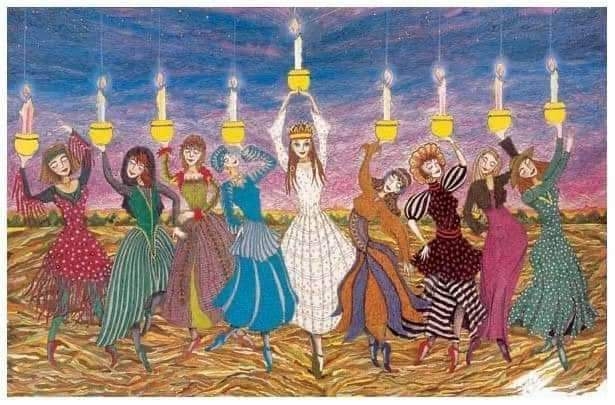 St Alban’s Episcopal Church Bolivar, Missouri Sunday, December 18, 2022 4 Advent Hanukkah  The Jewish celebration of Hanukkah begins tonight and ends on December 26. But what is it? It is not “the Jewish Christmas. “Hanukkah celebrates a historical event in Jewish history. In 165 BCE, the Syrian king, Antiochus, who ruled Palestine, tried to force Jewish resident to worship Greek gods. Many people did. But many others refused. There were those who defied the orders and were killed, too. But a Jewish priest, Judah Maccabeus and his sons along with other men took to the hills and waged guerilla war against the invaders. After three years, they succeeded in driving out the Syrians, and Jews were able again to worship God in the Temple. But the Temple had been defiled and required cleaning and rededicating. They wanted to light the ner tamid, the lamp of presence which burns continually to remind people of the promise “God is with us.” But there was only a little oil. They lit it anyway, and miraculously, the lamp burned for eight days, time enough to produce more oil. Hanukkah means, “dedication.” Each of the eight nights another candle is added to the 9-branched Menorah – the center being the shamash, not really one of the eight, but the one with which the others are lighted.  4 Advent Both the Isaiah and the Matthew readings are about trust in God – versus mistrust. Both the Judean King Ahaz in the 8th century BC, and Joseph in the first, were representatives of the people of God. Isaiah called Ahaz, “O House of David,” and the angel called Joseph, “Son of David.” In both cases, the individual men represented the whole people of God. Ahaz rejected the invitation to trust in God in the midst of an impossible situation, even when the prophet promised him a sign that all would be well: ‘The young woman will bear a son and the child will be named Emmanuel: “God is with us.” If he trusted God, his enemies would be destroyed within a couple of years – by then the little one will be eating honey and curds. Instead, Ahaz chose to try to find peace by allying with his enemy, Assyria. And the nation suffered. Joseph, on the other hand, paid attention to the messenger, the angel, who urged him, as a representative of the “house of David”, to believe Mary’s impossible word. Joseph, like Ahaz, was told that the young woman would bear a son and he would be called, “Jesus” – which is Joshua – which is “savior.” He will be called, “Emmanuel.” Once again, in impossibility: “God is with us.” If Joseph decided to trust God, as the representative of the people of God, then the whole world would be saved from our sins. And Joseph did. The key to salvation – any kind of salvation from Exodus until today, is wrapped up in trusting God. God will do what God does when we dare to trust God. And God IS with us. Soon, we will see him lying in a manger, an impossible savior.   |

Categories:
Tags:
No responses yet